
The politics of Indonesia take place in the framework of a presidential representative democratic republic whereby the President of Indonesia is both head of state and head of government and of a multi-party system. Executive power is exercised by the government. Legislative power is vested in both the government and the bicameral People's Consultative Assembly. The judiciary is independent of the executive and the legislature.
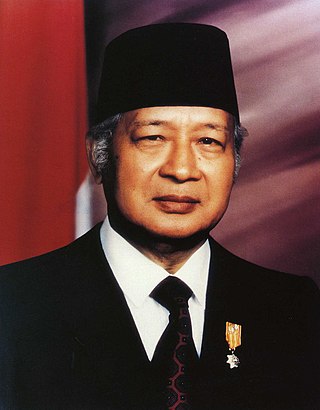
Suharto was an Indonesian military officer and politician, who served as the second and the longest serving President of Indonesia. Widely regarded as a military dictator by international observers, Suharto led Indonesia as an authoritarian regime from 1967 until his resignation in 1998 following nationwide unrest. His 31-year dictatorship is considered one of the most brutal and corrupt of the 20th century, as he was central to the perpetration of mass killings against alleged communists, ethnic Chinese, irreligious people and trade unionists.
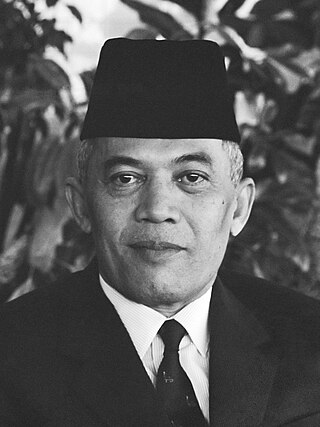
Abdul Haris Nasution was a high-ranking Indonesian general and politician. He served in the military during the Indonesian National Revolution and he remained in the military during the subsequent turmoil of the Parliamentary democracy and Guided Democracy. Following the fall of President Sukarno from power, he became the Speaker of the People's Consultative Assembly under President Suharto. Born into a Batak Muslim family, in the village of Hutapungkut, Dutch East Indies, he studied teaching and enrolled at a military academy in Bandung.

Suharto resigned as President of Indonesia on 21 May 1998 following the collapse of support for his 32-year long presidency. Vice President B. J. Habibie took over the presidency.

The May 1998 Indonesia riots, also known colloquially as the 1998 tragedy or simply the 98 event, were incidents of mass violence, revolutionary protests, and civil unrest in Indonesia in May 1998. The events were mainly in the cities of Medan, Jakarta and Surakarta, with small incidents in other regions of the country.
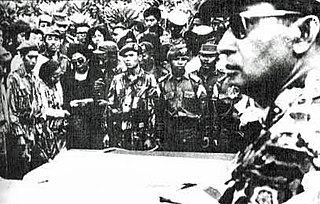
Indonesia's transition to the New Order in the mid-1960s ousted the country's first president, Sukarno, after 22 years in the position. One of the most tumultuous periods in the country's modern history, it was the commencement of Suharto's 31-year presidency.
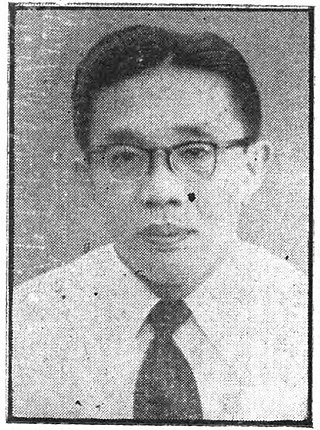
John Yap Thiam Hien was an Indonesian human rights lawyer.

The 1945 State Constitution of the Republic of Indonesia is the supreme law and basis for all laws of Indonesia.

Ali Sadikin was an Indonesian politician who served as the fourth governor of Jakarta from 1966 until 1977. Prior to becoming governor, he served as Minister of Transportation from 1963 until 1966 and Coordinating Minister for Marine Affairs from 1964 until 1966. He also served as Chairman of the Football Association of Indonesia from 1977 until 1981. Born to parents of ethnic-Sundanese descent, Ali attended the Semarang Shipping Science Polytechnic during the Japanese occupation period. During the Indonesian National Revolution, he joined the People's Security Agency Navy, the predecessor to the Indonesian Navy, and fought against the Dutch during Operation Product and Operation Kraai. Following the end of the national revolution, Ali remained in the navy and fought against the Permesta rebel movement in the late 1950s.

Johannes Cornelis Princen, also known as Poncke Princen, was a Dutch anti-Nazi fighter and activist. In 1948, he deserted the Dutch military, joining the Indonesian independence guerrillas in what was then the Dutch Indies.
Daniel Saul Lev was an American political scientist and scholar on Indonesia.

Avocats Sans Frontières (ASF), also known as Advocaten Zonder Grenzen or Lawyers without Borders, is an international NGO, active in the human rights and development sector. Created in 1992 by a group of Belgian lawyers, ASF’s main objective is the realisation of institutions and mechanisms that facilitate access to independent and fair justice systems that ensure legal security and guarantee fundamental human rights for everyone.
The Tanjung Priok massacre was an incident that occurred on 12 September 1984, in the port area of Tanjung Priok, Jakarta, Indonesia. Government reports give a total of 24 killed and 54 injured, while survivors report over 100 killed.
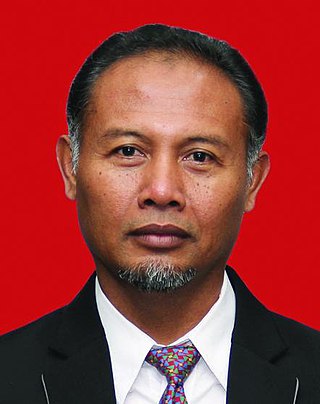
Bambang Widjojanto is an Indonesian human rights activist. He is the co-founder of the Indonesian Legal Aid Foundation and a "leading advocate for the rights of the indigenous peoples of West Papua". According to The New York Times, his work for indigenous peoples made him "the target of repeated threats and detentions by the Indonesian government".
Thomas Wapai Newei Sarampayai Wainggai was a West Papuan scholar, political and cultural leader, philosopher, and nationalist; as well as an advocate of West Papuan self-determination and Melanesian identity. He became one of the first West Papuan to get an advanced education outside of West Papua region. In 1988, he was arrested for his political beliefs and teachings and was sentenced to two decades behind bars. In 1996, he died as a political prisoner in a Jakarta prison.

The 1997/1998 activists kidnapping were abductions of pro-democracy activists which happened between the 1997 Indonesian Legislative Election and the fall of Suharto in 1998. The kidnappings took place in three different phases: before the May 1997 Indonesian legislative elections, two months before the People's Consultative Assembly (MPR) session in March 1998 and in the period just before Soeharto's 21 May resignation. None of those abducted during the first and third period have reappeared. Some of the activists who were abducted in the second period have openly spoken about their experiences.

Todung Mulya Lubis, S.H., L.LM. is a lawyer and activist in Indonesia. He founded The law firm Lubis Santosa and Maulana in 1986, later Lubis Santosa and Maramis.

Adnan Buyung Nasution, also known as Adnan Bahrum Nasution was an Indonesian lawyer, advocate, and activist.
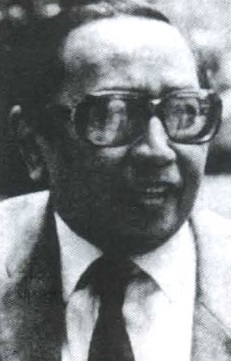
Suardi Tasrif was an Indonesian journalist, writer, and advocate. He became active in journalistic endeavors starting in the Indonesian National Revolution, and led the prominent newspaper Abadi during the Sukarno period since its founding in 1951 until its ban in 1960. He moved into advocacy during the New Order era, lobbying for legal reform in the Suharto regime's early years and becoming a prolific writer on legal and political matters. He has also contributed to the code of ethics of both the journalistic and advocacy professions in Indonesia.

The Indonesian Democratic Union Party,, was a political party founded by Sri Bintang Pamungkas in 1995 and one of the political parties in Indonesia that participated in the 1999 general elections.
















